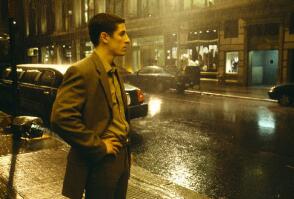Anything Else
reviewed by dave heaton
 For some reason I tend to gravitate towards artists who have a particular vision or worldview that carries through most of their work: visual artists, musicians, authors and film directors where each of their works carries similar elements, where it'd be easy to joke that each of their creations is just like the others. Woody Allen is definitely one of those directors. When you go see a Woody Allen film, you know to a certain extent what you're going to get, and there's something pleasurable in that. When the black screen with the white type starts displaying the opening credits as a classic piece of jazz music plays, it's a comforting feeling for me. His latest film, Anything Else, has most of the usual tropes of his films--in terms of style and substance. There's a romanticized view of New York City, neurotic characters, and plenty of one-liners. But there's also at least one element that's new, that makes the film feel more 'of-the-times'.
For some reason I tend to gravitate towards artists who have a particular vision or worldview that carries through most of their work: visual artists, musicians, authors and film directors where each of their works carries similar elements, where it'd be easy to joke that each of their creations is just like the others. Woody Allen is definitely one of those directors. When you go see a Woody Allen film, you know to a certain extent what you're going to get, and there's something pleasurable in that. When the black screen with the white type starts displaying the opening credits as a classic piece of jazz music plays, it's a comforting feeling for me. His latest film, Anything Else, has most of the usual tropes of his films--in terms of style and substance. There's a romanticized view of New York City, neurotic characters, and plenty of one-liners. But there's also at least one element that's new, that makes the film feel more 'of-the-times'.
Anything Else is one of Allen's relationship-centered movies, romantic comedies for lack of a better term. Its plot line is similar to portions of the storylines of Annie Hall, Manhattan, Hannah And Her Sisters, Celebrity and countless other Allen films (not to mention countless films by directors who take after him). In other words, it's about a person in a relationship who falls in love with someone else who is also in a relationship; they leave their respective partners for each other, and complications ensue. The person in question is an aspiring comedy writer named Jerry Falk (Jason Biggs), the "someone else" is a somewhat manic, enigmatic beauty named Amanda (Christina Ricci).
Both have their own psychological "issues" to work out--their own quirks, fears, and nervous habits--as does every other character in the film, including Amanda's mother Paula (Stockard Channing), an out-of-work, often drunk singer; Harvey (Danny DeVito), Falk's incompetent and overbearing agent; and most notably David Dobel, an older comedy writer who Falk looks to for advice. Dobel, played with a persuasive aura of instability and an dead-on sense of comic timing by Allen himself, is perhaps the film's most complicated character: a completely paranoid, xenophobic character whose fears seem like an outgrowth of post-9/11 New York City, even though his rants mention next-to-nothing of current events (they're more focused on the idea that the Holocaust against the Jews is still underway and he could be a target at any time.
If Dobel seems like a character who might not have existed in an earlier Allen film, most of the other characters and plot devices feel like they could have come from many. But Anything Else takes a different approach to the confused-young-people-in-love story. As the film unfolds, you continually get a sense of frivolity to the relationship in question that simply wasn't there in say, Annie Hall, which depended on the audience to feel moved by the fact that the relationship between its lead characters didn't work out. While the scenes between Biggs and Ricci are consistently funny, you seldom feel like this is an end-all, be-all situation for them. Perhaps its their youth, but its also the light approach the film has to the relationship, an approach that's consistent in tone, if not content, to that which he took in his last couple films (The Curse of the Jade Scorpion and Hollywood Ending).
 The weight in Anything Else comes less in the relationship at its center than in the fear and confusion lurking behind each of the characters in the film. The viewer's reaction to nearly all of them at various times is "what is the deal with this person?" And that's exactly where the film's heart lies. Near the beginning of the film, the camera often zooms in until we're quite close to the two leads' faces, as if to demonstrate that we're going to try to get under their skin. Most of the jokes (and there are plenty; this is quite a funny film in places, if not as funny as Allen's best work) are at the characters' expense; we laugh at their insecurities and at the situations they find themselves in because of their insecurities. The dramatic question in the film isn't "will these people end up with each other?," it's "will they be OK"? Confronting the fear of moving on, living with the notion that you'll die someday…these are serious issues, but Anything Else does a great job making us forget how serious they are.
The weight in Anything Else comes less in the relationship at its center than in the fear and confusion lurking behind each of the characters in the film. The viewer's reaction to nearly all of them at various times is "what is the deal with this person?" And that's exactly where the film's heart lies. Near the beginning of the film, the camera often zooms in until we're quite close to the two leads' faces, as if to demonstrate that we're going to try to get under their skin. Most of the jokes (and there are plenty; this is quite a funny film in places, if not as funny as Allen's best work) are at the characters' expense; we laugh at their insecurities and at the situations they find themselves in because of their insecurities. The dramatic question in the film isn't "will these people end up with each other?," it's "will they be OK"? Confronting the fear of moving on, living with the notion that you'll die someday…these are serious issues, but Anything Else does a great job making us forget how serious they are.
Copyright (c) 2005 erasing clouds |
|